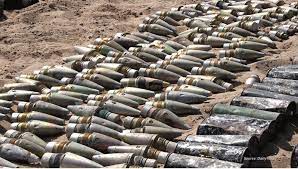What Are Chemical Weapons?

The US said that Russia could be planning a chemical or biological weapon attack in Ukraine.
- Earlier, Russian claimed that the US had chemical and biological weapons labs in Ukraine, which was denied by the US.
- A Chemical Weapon is a chemical used to cause intentional death or harm through its toxic properties.
Munitions, devices and other equipment specifically designed to weaponize toxic chemicals also fall under the definition of chemical weapons. - The Chemical Weapons Convention Act, 2000 was passed to implement the Chemical Weapons Convention (CWC).
- It provided for the establishment of a National Authority for Chemical Weapons Convention or NACWC.
- This institution, formed in 2005, is the chief liaison between the government of India and the Organization for the Prohibition of Chemical Weapons (OPCW).
Chemical Weapons Convention:
- It is a multilateral treaty banning chemical weapons and requiring their destruction within the stipulated time.
- Negotiations for the CWC began in 1980 at the United Nations Conference on Disarmament.
- The convention was drafted in September 1992 and opened for signature in January 1993. It became effective from April 1997.
- It makes it mandatory to destroy old and abandoned chemical weapons.
- Members should also declare the riot-control agents (sometimes referred to as ‘tear gas’) in possession of them.
- Organisation for the Prohibition of Chemical Weapons is an international organization established by the CWC in 1997 to implement and enforce the terms of the CWC.
- Members:
- It has 192 state parties and 165 signatories.
- India is a signatory of the convention.
- Convention Prohibits:
- The development, production, acquisition, stockpiling, or retention of chemical weapons.
- Transferring of chemical weapons.
- Using chemical weapons.
- Assisting other States to indulge in activities that are prohibited by the CWC.
- Using riot-control devices as ‘warfare methods’.




